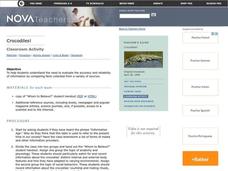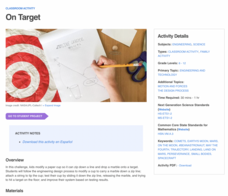Curated OER
Evaluating Potential Sources: Deciding What to Use and What to Reject
Teach young researchers how best to choose sources. This PowerPoint presentation underscores the need for accuracy, authority, objectivity, currency, and coverage.
Curated OER
Can Scientists Discover a Limit to Discovery?
Is there anything left to discover? Evaluate opposing sides of the debate regarding whether or not there is a future for scientific discovery. Middle and high schoolers assess quotations from the articles included to evaluate claims and...
Curated OER
Crocodiles
Work on research procedures in this lesson, which prompts writers to collect and evaluate information pooled from a number of sources. They work in teams to collect information about crocodiles from different sources. They compare the...
Curated OER
Engaging Young Scientists with Inquiry: Part Two
Evaluating data and learning to communicate the results is a big piece of the inquiry puzzle.
NASA
Evaluating a Lunar Eclipse
Do all lunar eclipses look the same? Find out in an activity where astronomers use the Danjon Scale of Lunar Eclipse Brightness to describe the color and brightness of the moon during an eclipse. Explorers make three observations using...
American Chemical Society
Evaporation
This is one in several lessons that explore the relationship between temperature and phase changes of water. After some discussion, elementary physical scientists place wet paper toweling on a hot and a room-temperature water bag...
Curated OER
Hamlet Research Paper: Find, Evaluate, and Select Appropriate Research Sources
Help young researchers find credible sources online. Modeling with a Google search for information about Shakespeare’s Macbeth, use a computer projector or Smart Board to show class members how weak the top three search results are....
NPR
Test and Evaluate the Prototype
Time to test the prototype. Groups test their prototypes to the plastics problem under consideration. The results of the tests and peer feedback offer a means to refine the prototype.
NPR
Brainstorm and Evaluate Solutions
May the best idea win. In groups, scholars brainstorm solutions to the problem statement developed in the previous lesson. The best idea moves forward to the prototype stage.
Curated OER
MountainQuest!
Your scientists are employed by NASA! They have to evaluate five potential sites around the world and decide which location would serve the scientists best. There are comprehensive lesson plans for this electronic field trip, and your...
Curated OER
Practice Evaluating Experimental Designs
In this experimental design instructional activity, students evaluate experiments using a design checklist. They suggest ways to improve the experiments and they identify all the components of the design.
Curated OER
Cosmetic Products Evaluation
Students evaluate different cosmetic products. In this chemistry lesson, students determine the physical and chemical components of their samples. They perform various test such as pH, viscosity, conductivity and formulate a conclusion...
Purdue University
Simple Machines – Dog Gone It!
How can people use simple machines to solve real-world STEM problems? Learn about simple machines using a hands-on, project-based learning activity. First, pupils investigate and evaluate simple machines. Then, they receive a task that...
Institute of Electrical and Electronics Engineers
Cast Your Vote
In a simple but unique lesson plan, youngsters learn about the history of voting systems. They then collaborate in groups to develop a new honest and consistent voting method. A class-wide poll is taken, evaluating the designs of other...
NASA
Data Literacy Cube: Global Atmospheric Temperature Anomaly Data
Evaluate global temperature anomalies using real-world data from NASA! Climatologists analyze a data set using a literacy cube and differentiated question sheets. Team members evaluate global temperature anomaly data with basic...
Institute of Electrical and Electronics Engineers
Trebuchet Toss
Young engineers work in teams to design and build their own trebuchets according to certain criteria; they must be able to launch a mini marshmallow accurately into a pie tin. Background reading material, a planning sheet for trebuchet...
Serendip
Golden Rice – Evaluating the Pros and Cons
More than half the world's population eats rice as a daily staple ... imagine if that rice could prevent illness. Scientists genetically engineered rice to include vitamin A for just that purpose. However, room for debate still exists....
Curated OER
Evaluating an Illinois Earthquake
Students develop awareness of occurrences of earthquakes in Illinois and their past and potential future damage, and examine distribution of earthquakes in central U.S. regions.
Curated OER
Evaluating the Strength of Scientific Evidence: The Rediscovery of the Ivory-billed Woodpecker
A happy discovery occurred in Arkansas in 2004: a woodpecker, believed to be extinct since the 1940s, reappeared! Or did it? Middle to high school ecologists examine scientific evidence and use critical-thinking skills to determine...
NASA
Roving on the Moon
Build a rover for pennies in a fun-filled activity! Young engineers design, build, test, and evaluate a lunar rover model. Using rubber bands, plastic straws, and cardboard, teams collaborate to make a rover model with spinning wheels....
NASA
On Target
Crash into engineering by sending a marble to land on a target by way of a zip line. Using a zip line, pupils put engineering design processes into practice by modifying a cup to carry and release a marble onto a target. Scientists test,...
Curated OER
Evaluating Algebraic Expressions (A)
In this evaluating algebraic expressions practice worksheet, students evaluate and solve the 11 algebraic expressions on this sheet.
Curated OER
Rainforest/Informational Web Sites that are Credible
Fifth graders evaluate whether various rainforest websites are credible and can be used for research purposes. They listen to the story "The Great Kapok Tree," discuss what makes a website credible, and examine and evaluate various...
Curated OER
Lesson 5-Elaborate/Evaluate Too Loud, Too Close, Too Long
Students begin with an analysis of loudness. They estimate the loudness of common environmental sounds, and then use their knowledge of hearing and loudness to evaluate the risk of noise-induced hearing loss for fictitious individuals....






















